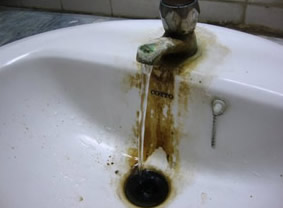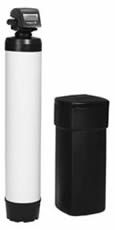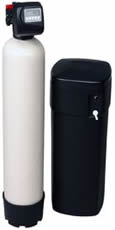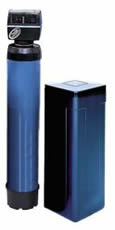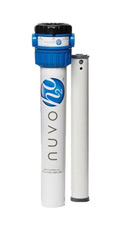Handling Hard Water with Ion Exchange Water Softening System
Of all the common water problems found in homes across the country, hard water may be one of the most frustrating. Hard water defined by the Water Quality Association of the United States as water that contains "hardness" minerals in a quantity greater than 1 grain per gallon or 1 GPG. Magnesium and calcium are the most common hardness minerals in water. Hard water can range from slightly hard (up to 3.5 GPG) to very hard (10.5 GPG or greater). Hard water not only has an unappealing taste and odor, it can also be unhealthy for you to drink and cause your laundry to become discolored.
The Problem with Hard Water
While hard water may be fine for certain home uses, such as washing the car and watering the lawn, it is not recommended as drinking water, or for many of the indoor needs that you have for water, like bathing, cooking, and a plethora of other uses you have for water in your home. Hard water can cause you to use more soap and other detergents around the home and can also increase the incidence of soap scum or "bathtub ring" that can be hard to remove.
Hard water can cause scale to build up on the inside of your plumbing system and water heater, increasing your utility bills and possibly causing your water heater to have a shorter life. This build up can also be the root cause of any low water pressure problems you may be experiencing with your home's water system. Hard water also decreases the life expectancy of your major appliances, such as your washing machine or dishwasher. Hard water used for cooking can also make boiled foods taste bad. In addition, hard water may be one of the culprits of diaper rash and other skin irritations. A simple water analysis can help you determine if your water is hard and if so, how hard it is.
Ion Exchange Water Softener Solution to Hard Water
For those homeowners who have found that their water tests as being "hard", a water conditioner or other water softening device may be required. One of the most commonly used water conditioning systems is the ion exchange water softener (like the Aqua-Pure AWS300M AWS Series Advance Water Softener System.) The ion exchange water softening systems on the market use an intricate process of ion exchange that replaces the hardness minerals in the water with (usually) sodium.
How Ion Exchange Water Softener Systems Work
The ion exchange process works in the following manner. The hard water flows across a "bed" of plastic resin beads. Mild electrical impulses adhere sodium ions on the surface of each bead, and when the hard water flows through the ion exchange water softening system, it passes across the beads. The minerals in the water that are "hard" hold a greater attraction to these beads than the sodium that has adhered to the bead - so when the hard mineral ions attach themselves to the bead, they displace the sodium ions that are there. Therefore, the moniker of ion exchange. Once the plastic resin beads have been covered with ions from the hardness minerals, a "brine" solution enters the resin tank to scrub the plastic beads, thereby removing the hardness ions. Clean water flushes away the brine and hardness ions, and the softener is ready to continue its cycle.
|
|


